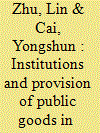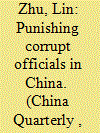| Srl | Item |
| 1 |
ID:
122317


|
|
|
|
|
| Publication |
2013.
|
| Summary/Abstract |
Ensuring the accountability of state agents requires the use of reward and sanction. Like other authoritarian regimes, the Chinese Party-state faces a dilemma in dealing with malfeasant agents: unprincipled tolerance undermines the regime's legitimacy, but disciplining officials may demoralize agents and result in the loss of state investment in them. Given this dilemma, selective or differentiated discipline becomes a logical choice. Using the case of social conflict management by local officials, this article explores the political rationale behind the use of selective discipline in China. It finds that two factors significantly affect the likelihood of an official being punished for mishandling social conflict: the severity of the consequences of the official's failure, and his or her role in the failure.
|
|
|
|
|
|
|
|
|
|
|
|
|
|
|
|
| 2 |
ID:
168655


|
|
|
|
|
| Summary/Abstract |
As a globally important energy-using country, China's energy efficiency improvement is crucial to achieving its energy-saving goals and economic transformation. This paper explores the improvement path, the improvement potential and the dynamic evolution of regional energy efficiency in China from 2005 to 2016 with an improved multidirectional efficiency analysis and the Markov model. The results indicate that (1) China's provincial energy efficiency is olive-shaped, and there is a significant spatial imbalance. (2) Most central provinces and a small number of eastern and western provinces need to adopt a one-way breakthrough path for their weak links. Most western provinces should adopt a step-by-step progressive or leap-forward path to improve energy efficiency. (3) The energy saving potential of the eastern and western regions is relatively large, and the potential value of CO2 emission reduction in the central region are relatively large. (4) In the short run, the comprehensive energy efficiency of different provinces aren't highly fluid between different levels; In the long run, the equilibrium state of energy efficiency in China will be at a mid-low level. Accordingly, it is recommended to strengthen exchanges between different regions, give full play to the resource advantages of each region, and differentiated and targeted energy efficiency policies should be carried out in different provinces.
|
|
|
|
|
|
|
|
|
|
|
|
|
|
|
|
| 3 |
ID:
145789


|
|
|
|
|
| Summary/Abstract |
In societies where formal institutions are absent or weak, informal institutions
are found to serve as mechanisms that enhance government
accountability. Pertinent research on China has come up with similar
findings. But two issues have not been adequately addressed in existing
research. One is the relationship between formal and informal institutions
in shaping government behavior if both types of institutions exist.
The other is the factors that affect the (re)emergence of informal institutions.
Based on a survey of about 800 villages in Guangdong province,
this article shows that the existence of both formal and informal institutions
may enhance government accountability in the provision of public
goods. Factors such as community history and practical needs
contribute to the (re)emergence of informal institutions.
|
|
|
|
|
|
|
|
|
|
|
|
|
|
|
|
| 4 |
ID:
064880


|
|
|
|
|
| Publication |
May-Jun 2005.
|
|
|
|
|
|
|
|
|
|
|
|
|
|
|
|
| 5 |
ID:
142566


|
|
|
|
|
| Summary/Abstract |
China presents a mixed picture in terms of its anti-corruption efforts. On the one hand, rampant corruption remains a huge challenge for the party-state because it not only results in the loss of state assets but also damages the legitimacy of the regime. On the other hand, China's record of curbing corruption is not particularly worse than other comparable countries. This paper explains the reasons behind this mixed picture by focusing on the anti-corruption strategy employed by the central Party authorities. Effective anti-corruption measures are determined by the high probability of detecting corrupt agents and the meting out of effective and warranted punishment. In China, the central government is unable or unwilling to investigate a large number of officials, especially high-ranking officials. However, at the same time, it must impose severe punishment on convicted high-ranking officials. Although this mode of selective discipline compromises the credibility of the state in terms of anti-corruption efficacy, it also creates uncertainty for corrupt agents because corrupt officials are not guaranteed exemption.
|
|
|
|
|
|
|
|
|
|
|
|
|
|
|
|